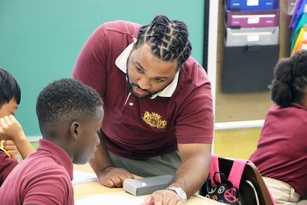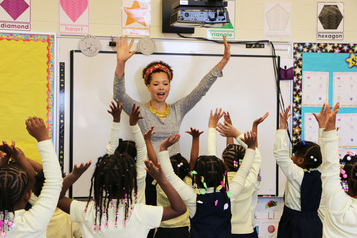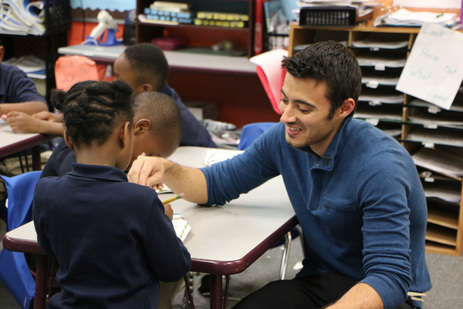
Close your eyes and think of a highly regarded profession. Are you envisioning a top-rated surgeon at a prestigious hospital? How about the CEO at a Fortune 500 company?
These careers have something in common: they require years of hard work and experience to even acquire the job. And along their career path, doctors and CEOs are given ongoing support and guidance from mentors, peers, and other experts in their field, ensuring they are successful in their positions. Even with this support, not everyone can make it in these intense, high-pressure roles with a high degree of accountability.
Teachers today have more in common with doctors and CEOs than you might think. Nationwide, we routinely fail to set the majority of our teachers up for the same type of success, particularly in our highest-need schools serving our most vulnerable students. In DC, most schools lose one-quarter to one-third of their teachers each year.
Too many new teachers become responsible for the achievement of 30+ diverse learners – without first learning how to do it or where to start. Teachers are left to sink or swim instead of being given the time and support to develop into effective educators. The results are devastating: new teachers leave out of frustration, student achievement plummets and communities suffer. Our students, however, don’t recoup this learning time and are often left in the lurch.
Our future doctors and CEOs are in our highest-need urban schools. If we invest in our teachers and provide the support and training they need to excel, we will give our students a fair shot at success. If not, the consequences are much more dire.
To prepare effective new teachers, we need to acknowledge that teaching is a complex, demanding job that requires a specific set of well-developed skills to ensure every single child in a class is learning and growing. Just like other professions, teachers need to learn first and receive ongoing support to be successful.
It’s one thing to read about lesson planning in a textbook, and it’s another thing to effectively deliver a rigorous and differentiated lesson to a class of students with a range of learning styles and varying skill sets. To ensure aspiring teachers are successfully implementing what they are learning in the classroom, they need high-quality former teachers to coach them. Essentially, they need teachers of teachers.
Coaching can shift developing teachers’ instructional practices in meaningful ways. The conversations, questions, and meaning-making that take place between an aspiring teacher and his or her coach lay the blueprint for how that teacher will reflect, plan and teach when they are responsible for their own class of students.
Developing the skills and behaviors of effective teachers is no easy task. It takes hundreds of hours of repeated practice working with children for aspiring teachers to learn how to design effective lessons, track student performance, respond to student needs, adjust instruction in real time, and move every student to deeper understanding. The only way to develop the expertise to meet the demands of the profession is through experience and intentional practice.

We would never let a new doctor treat children unless he or she had extensive training, was under the watchful eye of an expert, and received ongoing professional development in state-of-the-art practice. With the continued guidance of a coach, beginning educators have someone to ensure they are setting appropriate goals, planning meaningful lessons, and building productive classroom environments in their first years on the job.
It’s not enough to be passionate about serving students. School needs educators who have the skills to push 100% of their students to meet their learning goals. Coaches provide the feedback that develops our teachers’ abilities to do this. This continued on-the-job support in the early years can ensure new teachers are successful and stay in their schools.
This work takes significant time, but if we invest in building our future talent, we can develop the career teachers that our hardest-to-staff schools need: teachers who are confident and capable in their craft and who can effectively respond to the ever-changing needs of their students. We can stem the tide of teachers rapidly leaving the classroom and ensure a better quality education for all of our students.
We should take as few risks as possible with the education of our most vulnerable students. Let’s give teachers – who will impact the lives of thousands of students over the course of a career – the support they need to be successful. If we do, we will ensure that our children in the highest-need schools who aspire to become doctors, astronauts, CEOs, or anything else will be able to realize their dreams.


 RSS Feed
RSS Feed